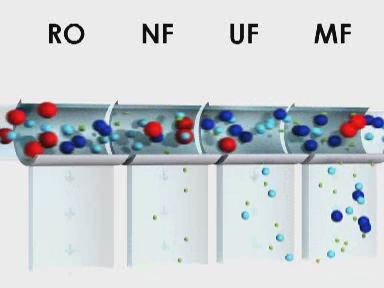The FundamentalThe FundamentalFiltration at Molecular Level A liquid consists of a number of components with different molecular or particle sizes. By using membranes with pores of different sizes, it is possible to separate exactly the components you wish to concentrate or remove from the liquid stream. Membrane filtration is a straightforward technology that separates a liquid into two streams using a semi-permeable membrane. A difference in pressure forces the components that are smaller than the membrane pores through the membrane as "permeate". The remaining components are retained as "retentate". A substantial flow moving parallel to the membrane prevents the membrane surface from getting blocked during the process. This is known as cross-flow filtration. Depending on the pore size of the membrane, the process is called: reverse osmosis (RO), nanofiltration (NF), ultrafiltration (UF) or microfiltration (MF). |


